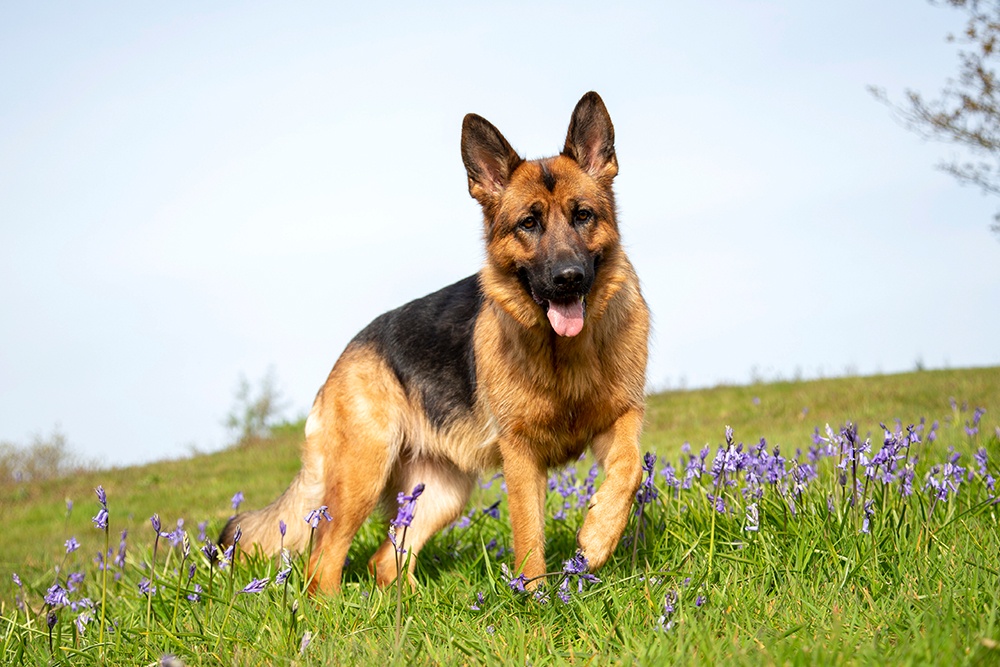German Shepherds, renowned for their intelligence, loyalty, and versatility, have long held a special place in the hearts of dog enthusiasts. This majestic breed, with its distinctive appearance and admirable traits, is not without its health challenges. Among the common concerns that German Shepherd owners may face, skin allergies emerge as a significant issue requiring careful attention and specialized care.
The intricate web of factors contributing to skin allergies in German Shepherds is as diverse as the breed itself. These factors may include environmental allergens such as pollen and dust mites, food sensitivities, or a genetic predisposition towards skin conditions. The manifestation of skin allergies in these dogs often presents itself through a range of uncomfortable symptoms, including incessant itching, redness, hot spots, hair loss, and recurrent ear infections.
Given the breed’s susceptibility to skin issues, it becomes imperative for German Shepherd owners to navigate the landscape of canine nutrition with a focus on addressing and mitigating skin allergies. A pivotal aspect of this journey is the selection of an appropriate and carefully crafted diet, designed specifically to cater to the unique dietary needs of German Shepherds grappling with skin allergies.
Understanding Skin Allergies in German Shepherds:
The German Shepherd, with its distinctive double coat and elegant stature, is unfortunately prone to skin allergies, a condition that can significantly impact their overall well-being. Skin allergies in German Shepherds can be attributed to a multitude of factors, making a comprehensive understanding crucial for effective management.
Environmental Allergens:
German Shepherds may develop skin allergies in response to various environmental triggers. Common culprits include pollen, dust mites, mold spores, and certain plants. These allergens can provoke an immune response in sensitive individuals, leading to skin inflammation and discomfort.
Food Sensitivities:
A significant number of skin allergies in German Shepherds can be linked to dietary factors. Food sensitivities, often manifested as allergic reactions, can result from proteins, grains, or other ingredients in their diet. Identifying and eliminating these triggers is a key step in managing skin allergies.
Genetic Predisposition:
The genetic makeup of German Shepherds plays a role in their susceptibility to skin allergies. Certain lines within the breed may have a higher predisposition to dermatological issues, making it essential for breeders and owners to be aware of the dog’s genetic history.
Parasites and Infections:
External parasites like fleas and ticks can exacerbate skin allergies in German Shepherds. These parasites not only cause direct irritation but may also transmit diseases that compromise the skin’s health. Additionally, bacterial or fungal infections can contribute to allergic reactions.
Underlying Health Conditions:
Health conditions such as hypothyroidism or autoimmune disorders can manifest as skin allergies in German Shepherds. Identifying and addressing these underlying issues is crucial for effective management and long-term well-being.
Recognizing the Signs of Skin Allergies:
To address skin allergies effectively, it’s essential for German Shepherd owners to be vigilant and recognize the signs of allergic reactions. Persistent itching, redness, inflamed skin, hot spots, hair loss, and recurrent ear infections are common indicators of skin allergies. Regular grooming sessions provide an opportunity to inspect the dog’s skin for any abnormalities and seek prompt veterinary attention if needed.
Factors to Consider in Dog Food for German Shepherds with Skin Allergies:
Selecting the right dog food for German Shepherds with skin allergies requires a thoughtful and informed approach. Consider the following factors to tailor your canine companion’s diet for optimal skin health:
Limited Ingredient Formulas:
Opt for dog food labeled as “limited ingredient” to simplify your German Shepherd’s diet. These formulations typically feature a single source of protein and carbohydrate, reducing the likelihood of triggering allergic reactions. This makes it easier for owners to identify and eliminate potential allergens from their dog’s diet.
High-Quality Protein Sources:
Choose dog food that incorporates high-quality protein sources. Options such as lamb, fish, or turkey are often well-tolerated and less likely to cause allergic reactions. Adequate protein is crucial for maintaining healthy skin and promoting overall well-being.
Avoid Common Allergens:
Identify and exclude common food allergens, including wheat, soy, corn, and dairy, from your German Shepherd’s diet. Additionally, be mindful of potential protein sensitivities; some dogs may react adversely to commonly used proteins such as chicken or beef. Observing your dog’s response to different ingredients is essential for pinpointing specific allergens.
Omega-3 Fatty Acids:
Prioritize dog food that is rich in omega-3 fatty acids, such as those derived from fish oil or flaxseed. These essential fatty acids contribute to a healthy coat, reduce inflammation, and support overall skin health. Omega-3s are particularly beneficial for German Shepherds with skin allergies, as they provide a natural anti-inflammatory effect.
Natural Antioxidants:
Look for dog food formulations that include natural antioxidants like vitamins C and E. These antioxidants help boost your dog’s immune system, offering protection against environmental stressors and contributing to the management of skin inflammation associated with allergies.
Probiotics and Prebiotics:
Prioritize dog food with added probiotics and prebiotics to promote a healthy gut microbiome. A balanced digestive system enhances nutrient absorption and aids in overall immune function. This can be particularly beneficial for German Shepherds with skin allergies, as a robust immune system plays a crucial role in managing allergic reactions.
Grain-Free Options (if necessary):
While not suitable for all dogs, some German Shepherds with skin allergies may benefit from a grain-free diet. It’s important to consult with a veterinarian before making this decision, as recent research suggests potential risks associated with grain-free diets. Your vet can provide guidance on whether this option is suitable for your individual dog.
Conclusion:
In the pursuit of ensuring the health and happiness of your German Shepherd dealing with skin allergies, the significance of a well-thought-out and tailored diet cannot be overstated. Selecting the best dog food for German Shepherds with skin allergies involves a comprehensive understanding of the factors contributing to allergic reactions and a commitment to addressing them through proper nutrition.
By acknowledging the multifaceted nature of skin allergies in German Shepherds, owners can embark on a journey of proactive management. Limited ingredient formulas, featuring a single source of protein and carbohydrate, offer a streamlined approach to identifying and eliminating potential allergens. Opting for high-quality proteins like lamb, fish, or turkey, while avoiding common allergens such as wheat, soy, and dairy, ensures a balanced and nourishing diet.
The inclusion of omega-3 fatty acids from sources like fish oil or flaxseed provides a natural and effective means of combating inflammation, supporting a healthy coat, and contributing to overall skin well-being. Natural antioxidants, like vitamins C and E, fortify the immune system, playing a vital role in managing skin inflammation associated with allergies.
The integration of probiotics and prebiotics promotes a flourishing gut microbiome, enhancing nutrient absorption and bolstering the immune system. This holistic approach to canine nutrition is especially crucial for German Shepherds with skin allergies, as it addresses not only the symptoms but also the underlying factors contributing to allergic reactions.
While grain-free options may be beneficial for some dogs, it’s essential to approach this decision with caution and consult with a veterinarian to ensure the appropriateness for your individual German Shepherd. Recent research has raised concerns about potential risks associated with grain-free diets, emphasizing the importance of professional guidance in crafting a suitable nutrition plan.
FAQs
Q1: How can I tell if my German Shepherd has skin allergies?
A1: Watch for signs such as itching, redness, hot spots, hair loss, and recurrent ear infections. If you notice persistent symptoms, consult with your veterinarian for a proper diagnosis.
Q2: What ingredients should I avoid in dog food for a German Shepherd with skin allergies?
A2: Common allergens include wheat, soy, corn, and dairy. Additionally, some dogs may be sensitive to specific proteins like chicken or beef. Consider limited ingredient formulas to simplify the diet.
Q3: Can a grain-free diet help with skin allergies in German Shepherds?
A3: While some dogs may benefit from a grain-free diet, recent research has raised concerns about potential risks. Consult with your veterinarian to determine if a grain-free option is suitable for your individual dog.
Q4: What role do omega-3 fatty acids play in managing skin allergies?
A4: Omega-3 fatty acids, found in sources like fish oil or flaxseed, have anti-inflammatory properties that can help reduce skin inflammation, promote a healthy coat, and support overall skin health.
Q5: Are probiotics and prebiotics important for dogs with skin allergies?
A5: Yes, probiotics and prebiotics promote a healthy gut microbiome, aiding in nutrient absorption and supporting the immune system. This can be beneficial for German Shepherds with skin allergies.
Q6: How often should I change my dog’s diet to manage skin allergies?
A6: Changes to your dog’s diet should be made gradually, and it’s crucial to monitor their response. Consult with your veterinarian before making significant changes and work collaboratively to find the most suitable nutrition plan.
Q7: Can I provide homemade food for my German Shepherd with skin allergies?
A7: Homemade diets can be considered, but it’s essential to ensure they are nutritionally balanced and meet your dog’s specific dietary needs. Consult with a veterinarian or a canine nutritionist for guidance.

Jane Doe, a veterinarian with over 10 years of experience, combines her deep knowledge of animal health with a passion for pet welfare at PetsPonder.com. With a DVM degree and a commitment to the latest in veterinary science, Jane Doe offers reliable, compassionate advice to help pet owners make informed decisions for their furry companions.

Leave a Reply